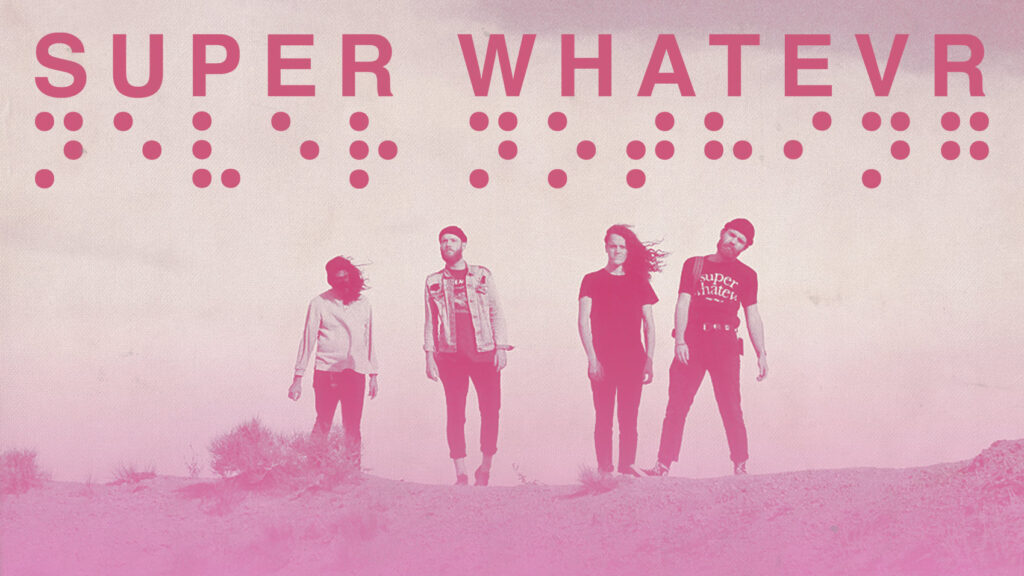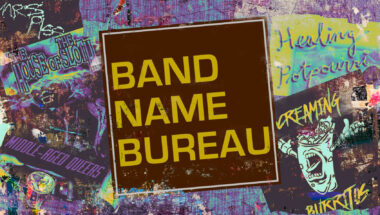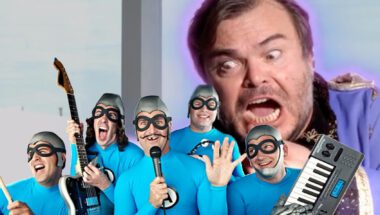“I wanna kill myself, but I’ll go read a book instead.” This is the first thing vocalist/guitarist Skyler McKee says in the Super Whatevr song, “Telelelevision.”
It’s a fascinatingly-loaded, attention-grabbing Rorschach of a line. To some, the lyric might evoke an appreciative smirk, not unlike Kurt Cobain’s most bluntly-ironic bon mots. To others—especially in the wake of last month’s Mental Health Awareness Month, the controversial second season of Netflix’s 13 Reasons Why, and Anthony Bourdain’s shocking suicide—the lyric may scan as callous or insensitive. The latter interpretation matters deeply to McKee, who uses Super Whatevr as a vehicle to not only express his own struggles with depression, but to extend positive outreach to those working through their own mental health issues.
The Orange County quartet—rounded out by guitarist Nate Wickander, bassist Josiah Beason, and drummer Josh Gomez—is something of an overnight sensation in the indie/emo world. One and a half years ago, they failed to generate even a quarter of their $8,000 GoFundMe goal to self-produce a debut album. Today, they’re a rising star on influential mid-major Hopeless, and on the verge of serenading Riot Fest 2018 with impossibly infectious, thought-provoking selections from last January’s Never Nothing.
Read on and see why McKee is a real-life advocate of “Leave the gun, take the cannoli.”
RIOT FEST: Tell me about the braille on your album cover. Is it the title of the record, the band name, something else?
SKYLER McKEE: That’s the title of the record. It says Never Nothing.
Did anything in particular inspire that aesthetic decision?
Multiple things. Back in the day, Kanye, Rihanna, and Paul McCartney made a couple of songs together. One of them was “FourFiveSeconds,” and I loved the single artwork: It had braille across the front. I saw that and I was like, “Oh, that’s really cool,” in passing.
When we were making the artwork [for Never Nothing], I didn’t want to really tamper with [the cover] design, I loved it so much. Instead, I just slapped braille on it.
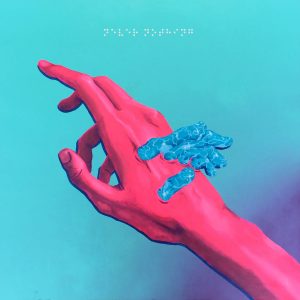 The whole concept of the album is, “What’s wrong?” “It’s nothing.” It’s never nothing. So, just pay attention to people you care about, love [them] well, therapy helps a lot… that type of thing. The whole point of Super Whatevr is a hidden-in-plain-sight-type of thing where, “Super whatever, nothing really matters.” But when you dig deeper, the whole point is suicide prevention, and trying to do something to help people. At first glance, it doesn’t mean anything; but when you dig deeper, you can find meaning for yourself.
The whole concept of the album is, “What’s wrong?” “It’s nothing.” It’s never nothing. So, just pay attention to people you care about, love [them] well, therapy helps a lot… that type of thing. The whole point of Super Whatevr is a hidden-in-plain-sight-type of thing where, “Super whatever, nothing really matters.” But when you dig deeper, the whole point is suicide prevention, and trying to do something to help people. At first glance, it doesn’t mean anything; but when you dig deeper, you can find meaning for yourself.
Yeah, on its face it seems flippant and dismissive, but it’s not at all. That seems to apply to some of your lyrics, too.
Yeah, that’s kind of the point. My cousin was suicidal, and I started the project from coping with that place and trying to find a way to have helped. That’s the concept of the project: Don’t pay attention, don’t look too deep; but if you need help, we’re here to help.
It’s uncommon to see a young band with so many videos—two from last year’s Good Luck EP, three so far from Never Nothing. What are the advantages of that medium in 2018?
We’re probably going to be coming out with a couple more, too… I just like making videos. I like making stuff across the board. Whenever I saw really good bands, I saw that they had a ton. I know some bands [where] every single one of their singles will have a music video. I don’t know which one came first: the song popping off and then the video, or the video and then the song popping off. So, I was like, “Well, maybe I’ll just make a bunch of videos for the songs that I like. Maybe that’ll make them do better.” [Laughs] Any song that had a concept, I felt deserved a music video.
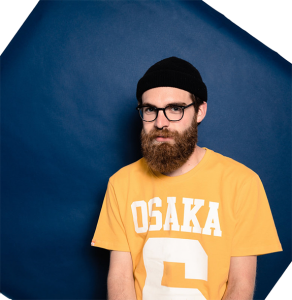 You’re very front and center in all the videos, and certainly come off as the clear mouthpiece of the group—your bandmates even wear masks in the “Someone Somewhere Somehow” video. Is there an intent to create a bit of iconography with your beard/glasses/cap look in “Telelelevision” and “For You” clips
You’re very front and center in all the videos, and certainly come off as the clear mouthpiece of the group—your bandmates even wear masks in the “Someone Somewhere Somehow” video. Is there an intent to create a bit of iconography with your beard/glasses/cap look in “Telelelevision” and “For You” clips
I don’t really have an answer. I think that we got signed really young, so it’s been kind of a process of finding that exactly: what we stand for, what we look like, how we stand out. I think album one is great; album two is definitely going to set us apart.
From the first line of “Telelelevision” to spitting out cereal and putting your hand over an oven burner in the “Bloomfield” video, you hit a sweet spot of balancing serious subject matter and goofiness. Do you think people are more or less appreciative of black humor these days, given the current sociopolitical climate?
I was really nervous putting out this type of material in terms of the tone; because it is silly, but also dealing with depression and anxiety, and mental illness in general. But I think people really respect it and relate to it, because when you’re struggling with depression, you put it off constantly… or you just deny it. So, I wanted to make that a welcoming place for people who are struggling to see a similarity in that, feel like they can connect with it, and go from it.
I was actually really nervous to release stuff like this, [thinking] people would be like, “Hey, you’re mocking.” There was one kid who said that the “Telelelevision” video was glorifying depression and anxiety, and I was like, “Yes! I struggled with anxiety and depression, and now I’m free from it.” I’m not saying, “Oh wow, it’s so great to be this,” but I’m going to put it out there. I’m going to say that you can get better.
You mentioned that you were looking forward to setting yourself apart with your second full-length, but so far very few of your songs sound alike. You already touched on this, but do you think your aesthetic is still developing?
I think when that record was recorded—because we recorded it about a year before it came out—the point was do a bunch of stuff, because at the time, there wasn’t really much of a direction. I mean, there was a direction, but we were able to choose at that point. I didn’t know if I wanted to be in the alternative scene, if I wanted to move us towards more of an indie-rock route or more of a mainstream rock route. Those were the options, and I was like, “I’m not gonna limit myself to any of these. Let’s just put out material that can fit in each one of those veins and not be cheeky about it.” I don’t want every song to sound completely different. [They can] still have that common thread, but give us wiggle room in case we want to move in a different direction; which, lo and behold, we do.
I assume you’re writing new material now. Without giving too much away, what directions are intriguing you the most?
I’m at our guitarist’s house right now, and we’re about to track some stuff. I want to write more vulnerable and more catchy, and that’s it. I want to do this for a long time and I want to help a lot of people, and I will do that in any way possible.
Tell me about some of the artists that you’ve personally found therapeutic.
Have you heard of the band the Chariot?
Oh yeah.
They’re not around anymore, but they were a big influence; because all of the lyricism was deeply rooted in philosophy, but they were a thrash band. So, if you weren’t paying attention, you’d be like, “Oh, they’re just loud,” but they had a lot to say. I really appreciated that. They had a lot of secret messages and stuff you can find, being a fan. I really respect that type of art—the deeper you dig, you’re able to find more substance to the art.
Music was a nice little blanket to help. I went to therapy, and that obviously helped a lot more. I think music can bring up the issues, and then I think that trained professionals can actually work backwards and help you heal.
Does a band like the Chariot translate in a tangible way to what Super Whatevr produces artistically?
Yeah. We put secret stuff in every music video, and a ton of tracks, and a ton of posts, and a ton of everything, hoping that someone cares enough to go find it later.
Changing gears a bit, was it as awkward as it looked to play a morning news show?
It was horrible. We had fun—because we have fun no matter what—but yeah, it was funny. There was one guy at the end of that evening—because we ended up playing a show that night—he came up and was like, “Hey, I just saw you on the news this morning.” I can’t say anything anymore—none of us really can—without kids making fun of it. Every single word that I said on that, someone had something to say about it, to kid about or make fun of. I think it’s funny.
How did you even book that?
I have no idea. We got a ton of interviews [throughout] that tour, and our manager was like, “Hey, do you want to be on the St. Louis morning news?” And it was like, “Uhhhh, okay, sure.”
Yeah, it was cool. [The anchor] asked some weird questions. It was funny, because they just don’t care. They’re just trying to do their job. She asked me questions, and then would start talking before I’d finished with the answers. She was just trying to get her show done. But whatever. We were on the news, that’s fun.
Is that the oddest gig that you guys have played to date?
I played a birthday party once.
In the form of Super Whatevr, or just you solo?
Yeah, all Super Whatevr songs. I played for like two hours for a 13-year-old. There were a lot of cuss words and songs about suicide, and she loved it. I talked to her mom first. I was like, “Hey, is that cool? Should I not play those songs?” And she was like, “No, play anything.” So, I played for two hours straight.
Was this an indie version of Make-A-Wish or something? Did she get in touch with you or your manager, or…
She was a fan; she DMed me, and I was like, “Okay.” It was fun. She’s one of our first fans, so she deserves it, if anyone.
You had a GoFundMe a year and a half ago that raised $1,800 of an $8,000 goal to finance your debut LP. What happened? How did you go from struggling band scrounging for money to all of a sudden being on Hopeless, of all labels?
I took out two credit cards and now I’m in a lot of debt—I spent a lot of money on a lot of things. Pat [Miranda] from Movements put in a good word, because they were getting some push. We sent an email to Hopeless with our EP, and got an interview. We sat down, and by the end of the weekend, we had paperwork. I don’t know what they liked, but they really like us—and still really like us—so everyone’s pushing us really hard. Then we got Chris [Nary], our manager, who works with OneRepublic and [other] really big artists. I’m not trying to think too much about all of the details; I’m just trying to enjoy the moment, because I don’t understand why all this is happening. But it is, so…
Does everyone still have day jobs?
Oh yeah, everyone has a job. It’s harder to go back to a job when you were gone for a long time, so we’re picking up odds-and-ends and trying to figure out how to get consistent work while [touring] consistently. So, if you know anyone who’s hiring… [Laughs]
What does the progression of forming the band roughly two years ago to playing something as enormous as Riot Fest this summer mean to you?
It means that we’re doing something nice, and I can tell my mom that I’m pursuing my dreams and making a career out of it. So thanks, Riot Fest, for making me not look stupid!
I love Chicago—it’s my favorite city. My girlfriend’s grandma told me I have to get a cannoli when I’m out there. She’s old—she knows old stuff. I love cannoli—it’s one of my favorite desserts, and I really like candy.
The National Suicide Prevention Lifeline is 1-800-273-TALK(8255). It’s free to call, and open 24/7.
Mental illness isn’t something to be embarrassed about. It’s okay not to be okay. For further resources, go see our friends over at Hope For the Day.
